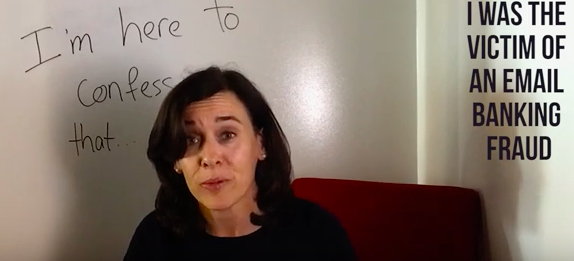When the Education Manager for the Commission for Financial Capability (CFFC) is capable of getting scammed, then we know that no one is safe!
In Episode 5 of ‘The Commission Confessionals’, a look into the financial sins of the office, Angela Clemens tells her story…
“Hi my name is Angela and I’m confessing that a couple of days ago I was the victim of an email banking fraud.”
Angela’s tale is like one of many others… An email, seeming sent by her bank that looked legitimate, with a link to her internet banking on it. After clicking through to enter the site, things got a bit odd.
“Sort of my screen went a little funny and said we can’t get to the internet right now. We can’t get into your online banking… and I thought ooo… that’s a bit weird”
The scam
What happened here was that Angela unknowingly visited a fake website – one that looked exactly like her bank’s website. These can look just like the real thing! Once she entered her bank login details on the website, scammers now had her details to log in themselves on the real bank’s website. Once in, they tried to siphon funds out.
Because of her bank’s superior fraud department, the transactions were caught before they went through. A real win this time!
While the thieves didn’t get away with it, Angela was left embarrassed. She feels like she should have known better – a common feeling we can all get after being scammed.
It just goes to show that this can happen to anyone – no matter who you are! Be vigilant when using the internet. And as Angela says, “Don’t take shortcuts to your bank, don’t take a shortcut path to anywhere important with your personal information on it.”
Our tips for avoiding this trap include:
- Only going to bank, government, and other important account sites through typing in their actual web address
- Never enter logins or personal details where you’ve clicked through from another site, email, or message
- Check the email address of the sender matches the details you have on file already
- Have an up to date antivirus installed
- Alert your bank if you think that an email is strange
- Visit Consumer Protection to read more about scams
- Tell family and friends about any scams you hear of so they can be aware, too!
Stay aware and alert online – protect yourself from scams and keep up to date with the latest scams on the internet.
We all make mistakes with money – the main thing is learning from those financial sins. Read more from CFFC here.









Join the Discussion
Type out your comment here:
You must be logged in to post a comment.